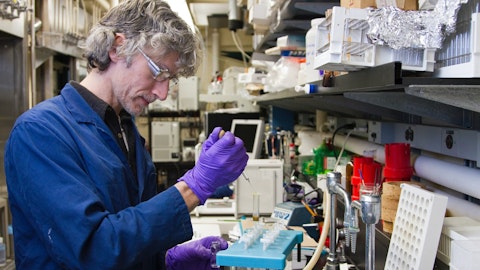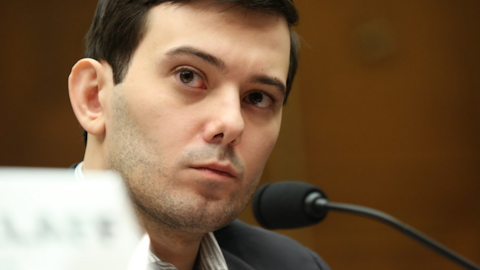Jeffrey Ajer: Thanks, Chris. So, let’s start with the VOXZOGO supply constraint issue, and I’ll ask Greg and Brian to jump in if they think I’m missing any here. But qualitatively, what I can tell you is by the time we were looking at our patient demand and the resulting unit demand forecast, the very beginning of this year, we anticipated that we would be getting to a point during the course of 2023 that we would not be able to satisfy all of the patient demand that we saw springing up in all of our commercial footprint. A reminder that we’re active now in 38 markets. So, our objective was two-fold during the course of the year. The first was to ensure or do our best to ensure that if we were starting patients on VOXZOGO therapy in any of those markets, that we could assure the supply continuity behind those specific patients, and that we would minimize or eliminate the risk that patients starting therapy would have to go off therapy for either a very short or a prolonged time, which required a lot of forward planning.
And a reminder, you hear a lot about the different dynamics of markets. You know, the different markets look very different. So, having, you know, a 38 market footprint to be projecting into, projecting those patient demands, looking at our labeled product supply, going out, six and nine months forward was a pretty dynamic situation to manage. But getting on top of that early, allowed us to say in certain markets, we’re going to delay our entry into that market because we can’t be assured of keeping patients on therapy once we start them, but also having a forward looking date that we’d be able to communicate and say, look, if we can’t get into this market on, May of this year, for example, with an increasing supply, still supply constrained, but supply increasing, when could we project that market to come online for patients to be treated.
Those are the kind of dynamics that we were working through. And as you can – as you can tell by the different quarterly results and our remarks during the year, we’ve now kind of reached that point where there are patients in certain markets that we are attempting to not get started on therapy because we can’t guarantee supply. And there are markets that we have earmarked for the future to open up and begin treating patients because we couldn’t guarantee the continuity of supply for earlier starts. Maybe I’ll pause there and look at Brian or Greg for additional comments.
Greg Guyer: Yeah, Chris, this is Greg. I’ll just add. So the way you should think about it and Jeff stated it, for the end of the, to the fourth quarter, we kind of – we’ll add 300 new patients, as you said. What you have to think about is we have done a lot of work since we were last on a call with you. And first quarter is less constrained. Second quarter is almost close to not constrained. And by mid-year, we’ll have no constraints. So it is – it is getting better by the day. So it’s not like some event happens in mid-year. It gets us to totally unconstrained. We’re going to be building inventory and building supply and able to support more and more of those patients. There is a significant uplift in patients in the in the first half of next year that we’ll be able to support.
And then by mid-year, we’ll be fully unconstrained for all those markets, all those patients. So think of it as a taper over time that we will start to go after those patients, as opposed to some event that will consume all those patients in mid-year, if that helps.
Henry Fuchs: And then Chris, I just want to address your question about certain earlier stage programs shifting. They haven’t. As part of our ongoing efforts to streamline communications, we’re going to be updating the street when we have clinical proof of concept. So those dates, just the points in time when we’re communicating updates have changed, but none of the actual advances have changed. So the next question.
Operator: Your next question comes from line of Paul Matteis of Stifel. Your line is open.
Paul Matteis: Great. Thanks so much. And I’ll add my congrats to JJ as well. Appreciate the question. I was curious, when you were undertaking the CEO search and succession planning over the past couple years, what were the two to three key things that you were prioritizing? And as you were thinking on selecting new leadership, how important was it that a new CEO would really stay the course in Biomarin’s core strategy over the past few years? Or I guess what I’m kind of trying to say is as we think forward, what are the chances here that Alexander Hardy does actually enact material changes over the next 6 months to 12 months and Biomarin in certain ways could look differently? Thanks so much.
Jean-Jacques Bienaime: Yes. So let me try to answer your question. So we’ve done a pretty comprehensive search, mainly over the past year or so that accelerated about a few months ago. And we had several very good candidates, but the Board thought that Alexander was probably the best candidate. As you know, he served as CEO of Genentech since 2019. Over there, he was responsible for the company’s $25 billion a year business and leading 13,500 employees. So we believe that he has demonstrated the ability to deliver growth, which is what continues to be needed at Biomarin. He steered Genentech through the loss of exclusivity of three major drugs during that time that together accounted for 40% of the company’s revenues in 2019.
And he returned the portfolio to strong growth by the end of 2022. So we believe that he has the ability to continue to grow our commercial business pretty successfully. We understand from reference checks that he’s a very good leader. And he’s been evolving and working in competitive markets, of course, a range of therapeutic areas, including hemophilia, as you might have noticed. And he’s overseen the launch of 10 new molecular entities during his time as CEO of Genentech. So he has a strong background and understanding in drug development and science. So, Alexander hasn’t been hard to make some major changes within Biomarin. He’s going to assess the situation and will determine what needs to be changed, if anything. But I think we all look forward to working with Alexander.
Operator: Your next question comes from the line of Akash Tewari of Jefferies. Your line is open.




